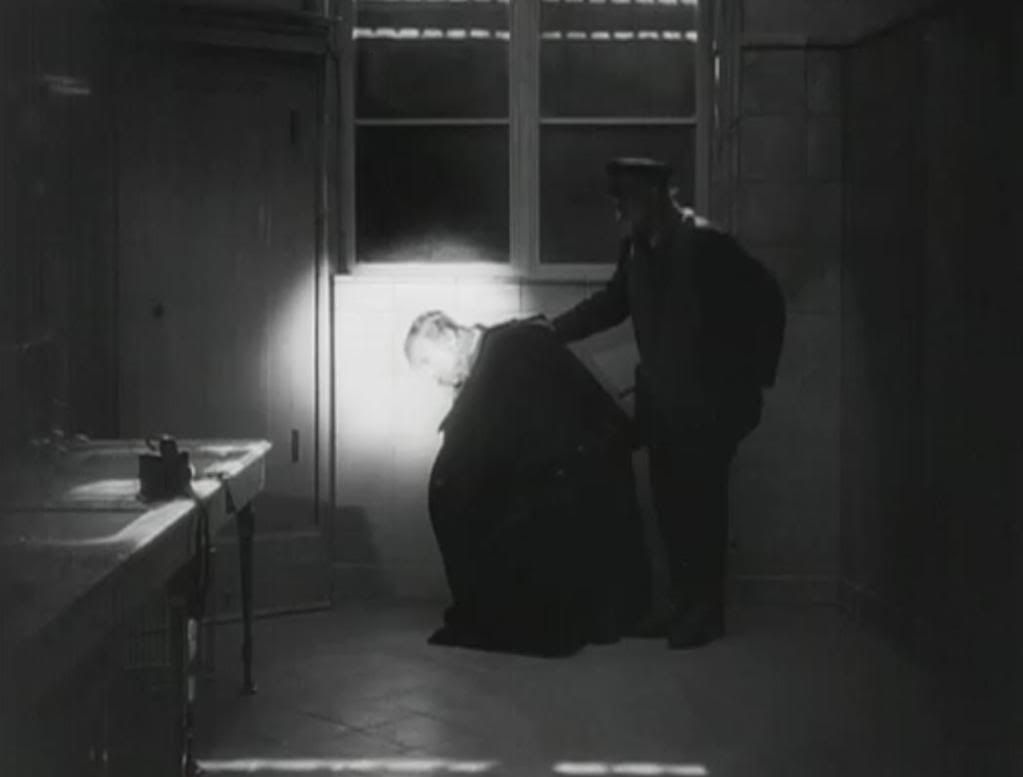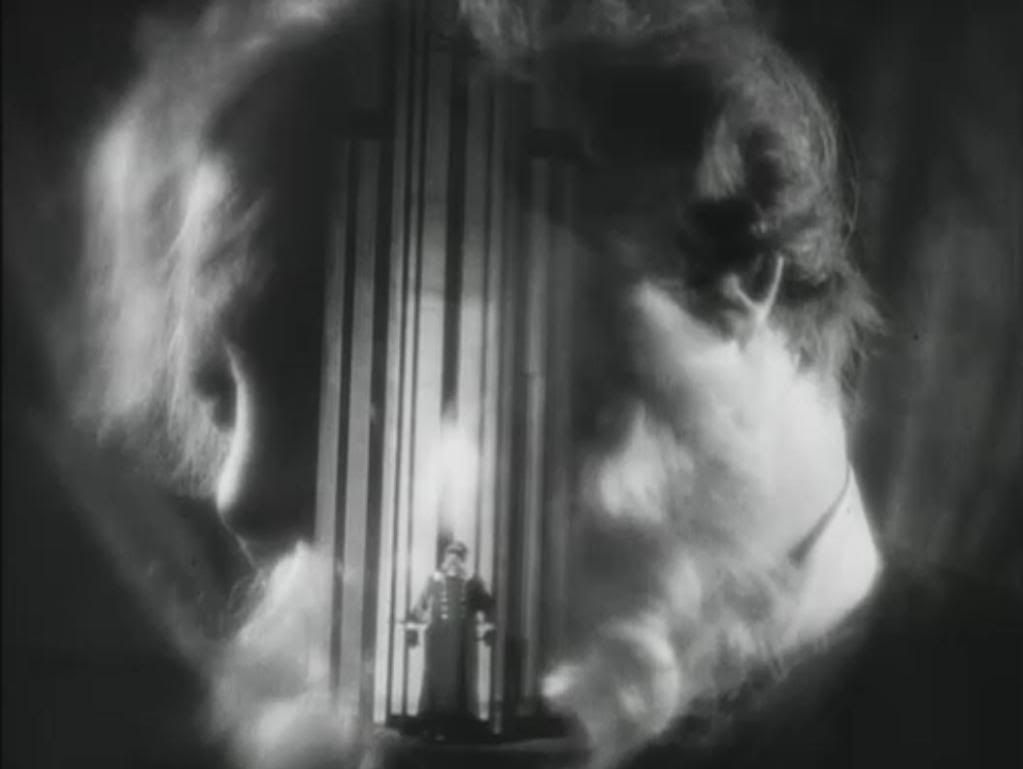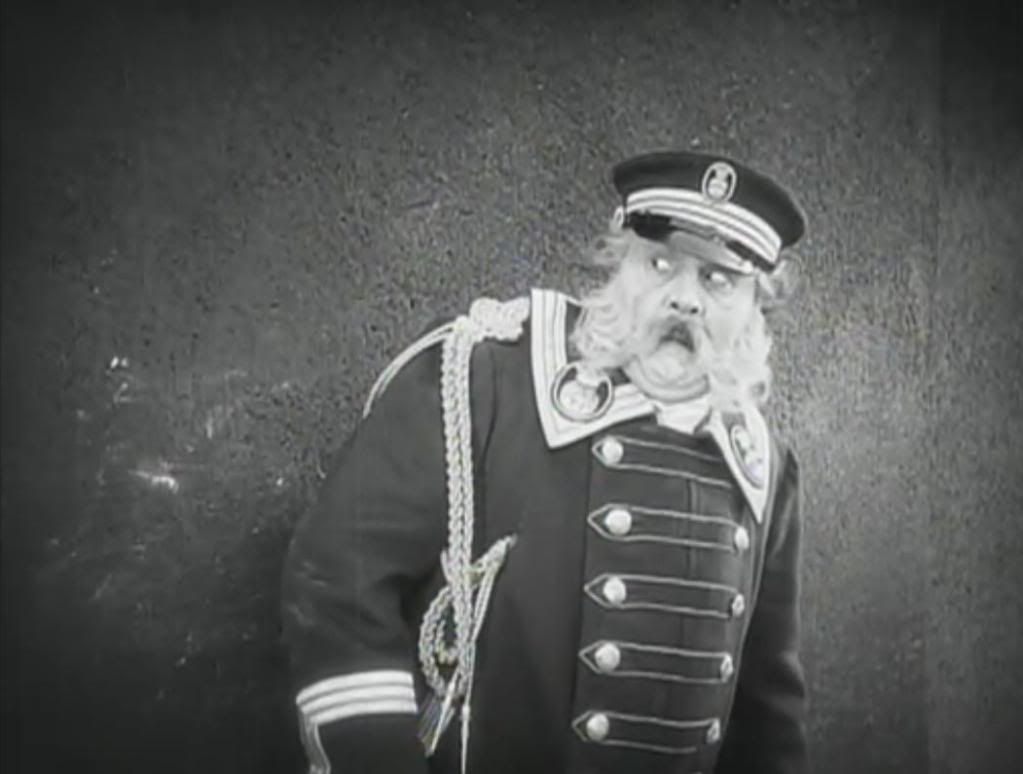
The Last Laugh was a crucial landmark in the history of the cinema. F.W. Murnau's 1924 classic was a dazzling technical feat that signaled several significant leaps forward in the early cinema: not only was it a work of pure visual artistry, with no dialogue intertitles, but Murnau and his crew (a prestigious group including cameraman Karl Freund and assistance from Edgar G. Ulmer) invented the first dolly shots in film and the first uses of subjective camerawork. Murnau freed the previously static camera from its moorings, and the results were stunning. The film's expressive, potent style movingly renders the story of a hotel porter (Emil Jannings) who is demoted for being too old and out of shape to properly do his job anymore. This is an unrecoverable blow for him, because everything he is, his entire sense of self-worth and identity, seems to be tied up in his job. In the film's opening scenes, he struts around the hotel, with bellboys scurrying to assist him in his work, and he obviously takes great pride in his puffed-up image, with his ornate, militaristic uniform. He waddles from the hotel to the curb, guiding guests in or out, summoning cabs, carrying bags, his girth straining proudly against the stiff front of his uniform with its rows of shiny buttons.
At home, he is equally proud, and when he enters the courtyard where he lives, everyone jumps to attention as though greeting a visiting dignitary, the men doffing their caps while he salutes. He walks stiffly, in obvious pain, his huge gut thrust out in front of him, exhausted from a hard day of work but still happy with his self-image, his view of himself as someone important. Even if it takes a tremendous effort to keep his back straight after each day, he endures the discomfort for the sake of the pleasure he gets from feeling so important and respected. When he's demoted from this proud position, his grand uniform rudely stripped from him, it shatters his world so badly that he can never recover, his job was so integral to his feelings of self-worth and happiness. The world is literally bent out of shape: leaving work after finding out about this change, the porter feels as though the hotel itself is going to crush him, in an extraordinary effects shot where the building seems to warp downwards towards the old man.
Later, drunk at a wedding, the porter sways and staggers, and the camera sways with him, tracing jittery arcs around the room from the old man's point of view, as his gaze drunkenly skips around the room. This subjective perspective aligns the audience with the old porter's attempt to erase his feelings of failure and abjection in revelry. This then fades into a dream sequence in which everything is hazy and distorted as though in a funhouse mirror, while the porter fantasizes about being restored to his old job and displaying a feat of tremendous strength, easily hefting a bulky trunk above his head with one hand. It's a fantasy of power and control, an assertion of the masculine virility that he now feels he's so completely lacking. This is a depiction of a society in which those who are past their peak are cast aside without further care, their will to live drained by the cruelty of the world's disregard. Even the porter's own family, when they learn of his new lowered status, quite literally recoil from him in horror, as though they're seeing a monster. It's almost comically exaggerated, but it makes the point: if a man's self-image is so thoroughly dependent on such shallow signifiers, on shiny uniforms and hollow prestige, then it is very easy indeed to tear him down and destroy him.


There's also a class component to this story, in that the porter's pride in his job and his uniform only causes him to be content in his relative poverty. He returns home to a decrepit, cramped tenement apartment and struts around as though he's an important and wealthy man, but actually he's a servant with a nice costume and an inflated sense of his position, which distracts him from his actual class status. Jannings' performance is remarkable, communicating all this complex emotion and social angst through his body language and his expressive eyes, about the only part of his face that's visible behind his ornate facial hair. When the porter learns of his fall from grace, he tries to keep up appearances by stealing back his old uniform, but it proves to be not enough. Whereas he used to return home with his chest puffed out, walking with a regal manner, his confidence is shaken now, and he skulks into the courtyard, hunched over, anxiously looking around as though he wants to simply disappear into the shadows. He has to remind himself to stand up straight and try to project confidence, but as he walks towards his apartment, his slouch returns, slowly but surely, and soon he's scurrying home past the laughter and disapproval of the neighbors who were once so awed by his seeming dignity.
The film has no textual titles except brief ones at the beginning and before the tacked-on, studio-mandated epilogue. Murnau and screenwriter Carl Mayer convey everything entirely through visuals, through performances. The complete lack of dialogue text is very refreshing, preventing the film from getting bogged down in endless reading breaks between images. Even in the one scene where Murnau uses text within the mise en scène, this text isn't simply a static paragraph. The porter learns of his demotion to restroom attendant through a letter, and Murnau displays this letter onscreen. But when the porter gets to the part that is for him the key phrase — the humiliating line that attributes this change to his "age and frailty" — the camera tracks along the words, following his eye as he takes in this disheartening phrase. The image then begins to blur, as if with tears, confirming that this is the first subjective shot in the film — and the first subjective shot in the then-short history of moving pictures! Even with the novelty long since faded, shots like this are incredibly affecting and bracing, as are the graceful tracking shots that zero in on the porter's distraught face at key moments.
The film proper ends with a haunting, stark shot of the porter slumped over in the restroom, totally broken and resigned to his fate. Murnau and Mayer wanted to end the film with the protagonist's sad death, completing their theme of a man crushed by his society's limiting ideas of a man's worth. The studio wanted a happier resolution, though, and Murnau and Mayer technically fulfill that mandate with a cynical, absurd epilogue that's practically dripping with sarcasm. It's even preceded by a title that explicitly identifies this ending as a deus ex machina, an intervention of the filmmakers with no relation to reality. In this ending, the porter is saved from his fate by an unlikely inheritance from a wealthy stranger, and he celebrates his good luck lavishly while doling out gifts to other unfortunate souls. The whole thing plays out as a ridiculous fantasy where it's entirely obvious that the director and writer have nothing but contempt for this addition to their art, and this tone winds up undermining the happy ending that the producers had wanted. In its very unreality, this epilogue simply reinforces the theme, since only an openly unrealistic miracle can save this sad man from what otherwise seemed an unavoidable and dismal fate.
It's a very beautiful film that shoudl serve as a great surprise to thise who think The Artist has anythign to do with silent cinema.
ReplyDeleteThe technical innovations in cmaerawork Murnau pioneered here caught Hollywood's eye and brought him to our shores. After that world cinema was never the same.
Yeah, it's great, very innovative and still quite moving even though of course its innovations are now anything but new.
ReplyDelete"Jannings' performance is remarkable, communicating all this complex emotion and social angst through his body language and his expressive eyes, about the only part of his face that's visible behind his ornate facial hair."
ReplyDeleteI see THE ARTIST backlash is alive and well, but I can watch that Hazanavicius masterpiece anyday, anytime, and applaud it's universal veneration. I saw the film as a beautifully modulated love story.
But yes, THE LAST LAUGH is one of the silent film landmarks, and one of a trio of Murnau films (the others being SUNRISE and NOSFERATU) that stands in the immortal ranks of world cinema. As anticipated you write with authority and passion and enhance the literature on this seminal work. Yes, it's a story of humiliation that predates THE BLUE ANGEL, but it's a far more disciplined work that like the best of silent cinema uses expressive acting and visuals to say what dialogue and intertitles could never quite replicate. The class component you discuss is of course vital in the picture, and that dazzling dream sequence shows what Murnau, Freund and Ulmer can accomplish at the height of silent film artistry mid 1920's. You perfectly frame Jannings' remarkable accomplishment in the excerpt above. It's one of the truly unforgettable turns by an actor in film history. Yes, the sarcasm and cynicism that resulted from studio interference properly poses the despairing denouement Murnau and Mayer had originally intended.
Beautiful work here.
I haven't seen The Artist, so I can't comment on that.
ReplyDeleteBut this film I adore, for Jannings' amazing performance, the gorgeous cinematography, the inventiveness of the dream sequence and so many other scenes, all of it. Just great stuff, and with its lack of title cards, one of the best demonstrations of silent film's pure visual artistry.
If I might add something here, I'd pose that THE LAST LAUGH's specific lack of intertitles was a deliberate attempt by Murnau and company to craft a film that attempted to speak a universal language, the purest artistic expression of the silent film form. That it achieves it goal here gloriously, is perhaps this masterwork's ultimate achievement.
ReplyDeleteSam, I think you're totally right. It's for that reason that I tend to favor silent movies that are sparing in the use of titles. The purely visual, universal language of the best silents is what makes them great.
ReplyDeleteEd,
ReplyDeleteWonderful stuff here on a film I've actually just seen for the first time and am planning my own essay. What a masterwork of pure genius and wonderful acting from Jannings. The camerawork, as you highlighted is incredibly visual, poetic, and haunting. I'm absolutely in love with this film right now.
Now I feel bad for not liking the film at all. But I'm seeing different things anyway. I see a pretty broad caricature of Germans in love with a uniform, even if it's just that of a porter. And that wasn't self-critique, it's settling the score with the Wilhelm/Bismarck parent generation. Those long shots on the guy who looks like he'll have a heart attack beacause he'll be seperated from his beloved uniform, the sexual undertones when he goes to steal it, that's purely vicious, no empathy at all. Dunno, give me Hintertreppe or Die Straße (also written by Mayer) anytime.
ReplyDeleteJon, I just saw it recently as well and was similarly blown away, obviously. It's just great.
ReplyDeleteLutz, that's an interesting perspective. I can certainly see some satire here, and the fascination with flashy uniforms is made to seem very sad, especially in the class context. But I definitely can't agree that there's no empathy here. Part of the film's tragedy is that all these people, the porter included, are so hung up on the allure of a uniform that their self-worth and happiness are tied up in it. It's a satire in that respect, for sure, but one that's very much about the crippling effects of this fascination on working class Germans. There's a great deal of feeling in this film, and Jannings' performance, broad as it can be, also has a great deal of emotion and dignity in it.
It just strikes me how it would really be worthwhile to discuss this and The Crowd together. Come to think of it there are so many parallels. The different ideas of abjection eg. Well only the guy in The Crowd is one of "us" and the guy in The Last Laugh is a dinosaur from the old world ...
ReplyDeleteAs usual, wondeful review. I also loved the film in its almost purely visual appeal. Regarding the "empathy/satire dichotomy" I think it's misleading. There are certainly both very present in the film. That is what explains in part the conviction carried by the film. Murnau obviously despises militarism and hypocrisy and therefore there is satire; but, at the same time, cannot avoid to recognize the humanity in people's frailties that are in fact what entails and underlies in real life snobery and hypocrisy -- to some extent militarism too. Really, in this film one cannot go with one without the other.
ReplyDeleteMiguel Preto
I must agree that the way the story unfolds without the interruptions of intertitles greatly adds to its power - the way so much is told through the changing expressions of Jannings' face. I was very taken aback by the over-the-top happy ending and at first felt it ruined a great film, but I like your comment that in fact it reinforces the theme since only a miracle can save him. It also strikes me that the hotel boss who was so dismissive of him in the main film is here ready to suck up to him when he has money, adding to the satirical note. Interesting to wonder how often directors have managed to undermine happy endings forced on them by the studios - there are many films where this type of ending does feel tagged on, and maybe this was sometimes done deliberately, as it is here, to signal up that it isn't the 'real' ending.
ReplyDeleteMiguel, that's right on. It's a satire AND a very moving, empathetic film. They're not mutually exclusive qualities and personally I think Murnau and Jannings do a great job of balancing them here.
ReplyDeleteJudy, I think this ending is especially blatant in its sarcastic tone, but it's often the case with studio-mandated happy endings that they don't feel organically connected to the rest of the film, drawing attention to themselves and thus undermining the supposed happiness. Murnau and Mayer went a step further by actually adding some text that all but says the happy ending is a fraud.
We watched this in History of Film about a month ago, and I wasn't expecting how emotionally devastating it would be. I'm used to the Murnau of Nosferatu, but I wasn't prepared for this. I really do wish it had ended immediately with that shot of Jannings shivering in the bathroom; the cynical happy ending just seems to throw it all off balance. While it's amusing that Murnau makes it clear it's just a contrived deus ex machina, I sort of wish there could have been a "director's cut" that had had the studio ending cut out. It's basically a bit of satire where satire isn't required.
ReplyDeleteIt also makes me very sad what happened to Jannings after this movie, letting himself be seduced by the Third Reich and all. I always hate it when a wonderful actor/filmmaker singlehandedly destroys his own career like that, and the fact that Jannings was forever disgraced by his ties to the Nazis is ironic in a way that's almost cruel; just like in the movie, his life went downhill after society scorned him (rather than celebrated him) for his uniform. I don't know if this has been suggested elsewhere, but maybe Tarantino killed him off in Inglourious Basterds as a kind of merciful wish fulfillment fantasy - to spare him all those miserable years that came after the war, before he died a broken man.
Yeah, this movie's really intense. One of Murnau's best, I think, and Jannings' performance is a big reason why. He was always fantastic, and it's definitely a shame he self-destructed after his amazing run in the silent era. Imagine if Jannings had been able to make the transition to talkies; he likely never would have returned to Europe and thus never would have joined the Nazis.
ReplyDelete